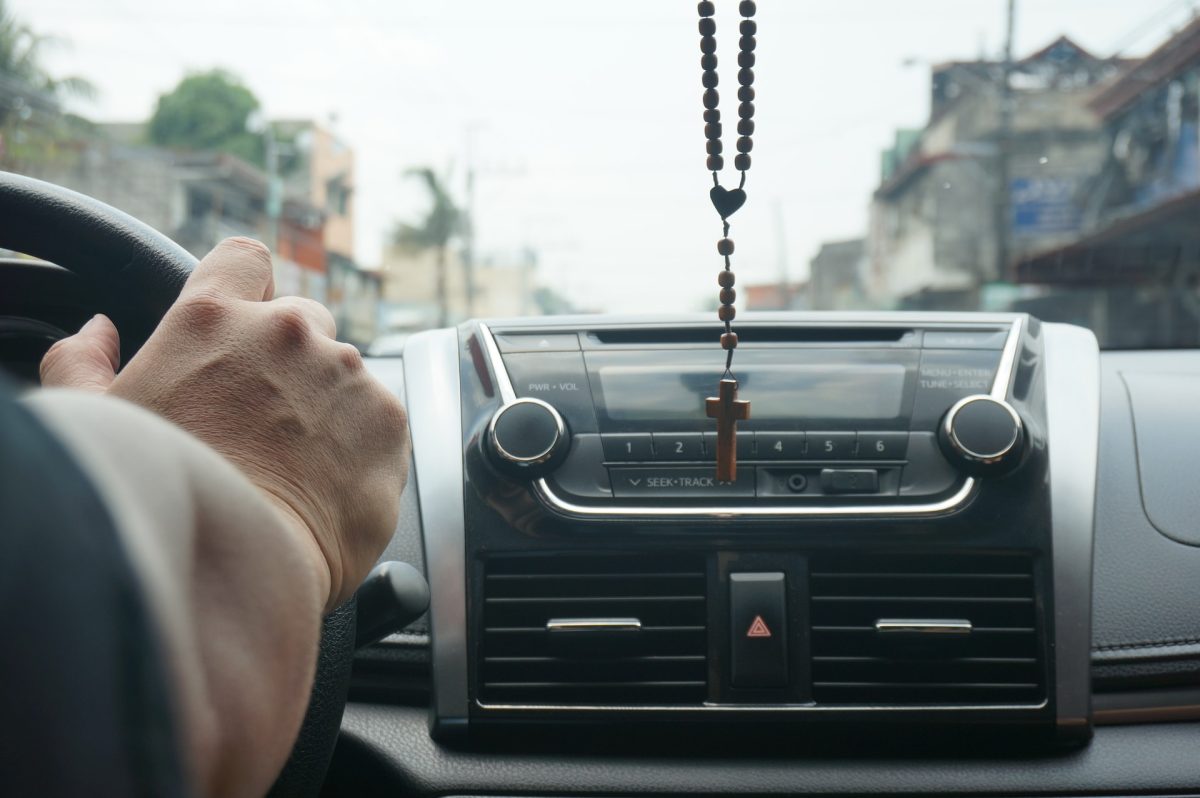By Amber Kinloch
Driving is one of the most common human activities. A lot of us spend a great deal of time behind the wheel, whether it’s during a daily commute, while running errands, or for travel. During this time, we confront a number of dangers and temptations. Yet by the same token we encounter opportunities to grow in virtue.
Given all this, it’s worthwhile to consider how we might sanctify this activity. Here are some practical ways to do so.
Beseech God’s Help
Back when I had a learner’s permit, I was nervous about driving. About that time, I happened upon a story in a book. The author wrote:
“The writer once asked a venerable bishop with whom he was traveling in a motor car through a crowded city if he were afraid of accidents, since a little time before, some serious collisions had taken place.
“‘Oh no,’ he [the bishop] replied. “When I get into a motor car, I at once place myself under the care of my Angel Guardian, and I feel quite safe.”
All About the Angels, Father Paul O’Sullivan, O.P., Tan Books, Chapter 7
This brief passage inspired me to cultivate the habit of praying as I begin driving. Over the course of five years, I’ve had a number of near accidents. Once, someone tapped me lightly on the rear bumper. Apart from that, I have been safe.
My family, likewise, has a devotion of keeping a St. Christopher medal clipped to the driver’s side visor in our cars. Various family members have been involved in accidents. Rarely were these their fault. Never has anyone been seriously injured. My dad (a non-Catholic) has become so convinced of the protective graces bestowed through this medal that he even takes one on an airplane.
Does my family’s use of sacramentals mean none of us will ever land in a serious accident? Of course not. Sacramentals aren’t magic. Yet these physical objects or actions, blessed by the Church, are still sources through which we can obtain spiritual and temporal favors.
I also greet God whenever I pass by a Catholic Church while driving. I’ll pray for whoever’s in need when an ambulance passes by, sirens blaring. I’ll ask for help in difficult moments. I’ll talk with God about what’s on my mind or just be with Him in silence. Sometimes, I’ve visualized Him sitting next to me in the passenger seat. All these little things have transformed my driving time into an opportunity to encounter God.
Curb Your Bad Habits
I’ll be candid: I’m one of those people who likes the gas pedal. It’s not so much that I’m impatient (though I do feel that way, at times.) Rather, I enjoy the thrill of whipping along at 70 mph on the highway. There’s something freeing about it.
But the reality is that speed limits are there for a reason. Going 10 mph over the speed limit might be the norm on the highway where it’s important to match the speed of the people around us. But on icy roads or in quiet neighborhoods full of children, exceeding the speed limit can have more dangerous consequences. We must exercise prudence and avoid driving recklessly for the good of ourselves and others.
Similarly, it’s common sense that people shouldn’t text while driving or engage in other overly distracting activities. That doesn’t mean you can’t do anything but drive. Listening to music or an audiobook or having a conversation with someone are perfectly acceptable activities for most drivers with experience. But we must know our personal limits and abide by them.
For me, that means practicing serenity to curb my senseless hastiness. Someone else might need to focus on their driving more and avoid culpable distractions like glancing at their phone. Another person might need to brush up on basic skills like staying in their lane, maintaining a proper following distance, parking between the lines, or using turn signals.
Practice Love of Neighbor
Driving is one of those activities that tries people’s tempers. We’re tired after a day’s work, and traffic is heavy. The weather is bad. Somebody is going too slow or too fast. Another person cuts us off, nearly causing an accident.
It is easy to get frustrated in situations like these and spout off complaints and curse words. Often, we even forget, in a sense, that other people are driving the cars around us. Instead, we talk about how that truck/minivan/sedan was a jerk for doing ___. Wrath, unchecked, not only distracts us and steals away our peace. It can even lead us to seek revenge, e.g., by deliberately cutting off somebody who angered us.
The virtue of meekness is essential while driving. This virtue moderates our anger over perceived injustices so that we don’t lose control of ourselves.
Actively looking outward and showing kindness towards our neighbor is also important. Little acts like letting someone move over into your lane when the road is congested or park in a closer spot to the store are good ways to practice charity. How about praying for the other drivers around you or seeking the intercession of their Guardian Angels? I find that this helps, especially if I am annoyed. Likewise, I thank God for the drivers who show charity towards me when I am distracted, need to get over a lane, etc.
Make the effort to drive well for love of God and neighbor. It will bring you peace and keep you on the road to Heaven.

Amber Kinloch
Amber writes from the bunker of her living room. There she hunkers down with her laptop and a blanket while keeping an eye and ear tuned in to the activity of family life. Music set on loop keeps her energy flowing as she muses on the deeper happenings of ordinary life and what food to restock the fridge with.






I find that the rosary is a great cure for road rage. The beads are my fingers on the wheel. On a longer trip, I add the Divine Mercy. That takes care of a half hour trip, and of course there is another hour of rosary before you need to repeat.
Until very recently, I drove more than 200 miles per day. I said at least one Rosary on the way into work and one on the way home. (You can count on your fingers or get a Rosary ring so you can keep your hands on the wheel.) Once I started this practice, my language and my attitude gradually changed. When someone cut me off or drove more poorly than me(!), I would pause my Rosary and add a Hail Mary for that person’s intentions. If I was still angry, I would add another. And another, until I back in control of my emotions. My daily commute, which I previously hated, became my cherished time with God and our Blessed Mother.
I’ve been praying the rosary/Divine Mercy Chaplet on my commute (nearly an hour) for many years, even on my motorcycle. It leaves precious little time for “road rage “ etc.
Like the reminder of praying to our Guardian Angel for protection
How about saying the rosary or the chaplet when driving, esp. on long trips and esp. if you have young children, they learn to quiet down.
I’ve done that with my family, Helen. It is a great practice.
The only time I advise against it is when you need to give driving your entire focus. For example, during the morning commute in the D.C. Metro area where there’s a lot of stop-and-go traffic.
I live in a very rural area, I have to drive 400 miles to find challenging traffic but I had to take my husband to the doctor in Houston. I relied on my guardian angel to get me through traffic and safely through the hospital. There was always a large clear space around the car, no close calls. Guardian Angels got us there and back safely.
P.S. If you like driving fast, try I-80 in western Nebraska. Speed limit is 80 mph.
That is a great account, Jacqui. I find it especially helpful to pray to another driver’s Guardian Angel when I’m feeling angry with that person.
Thanks, too, for the note about Nebraska. The thought of an 80 mph speed limit is very appealing. 🙂
Very well done. We all need to help each other in order to stay on the road to heaven. Thanks for helping.
Confess your transgressions even those done in the privacy of your car
Great article, thanks…applies to me big time! 🙂